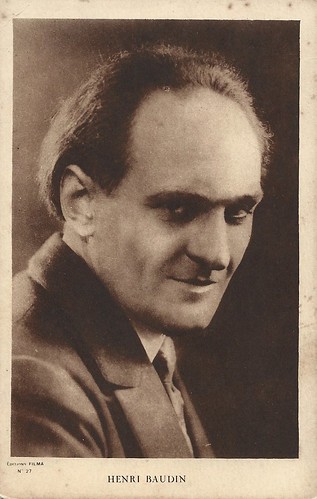
French postcard by Cinémagazine, no. 148. Photo: Studio V. Henry.
The Three Musketeers
Henry Pierre Baudin was born in Lyon, France, in 1882. He started his film career during the First World War in Sous les phares/Under the lighthouses (André Hugon, 1916) co-starring with Marie-Louise Derval and André Nox.
After an interval of some 4 years, Baudin performed again in the crime film Le piège d’amour/The trap of love (Alexandre Ryder, 1920) with Huguette Duflos. From then on he had a steady and prolific film acting career, which continued after the sound film had set in, into the early 1930s.
After L’Idole brisée/The broken Idol (Maurice Mariaud, 1920) starring Lina Cavalieri, Baudin was Macquart in the Emile Zola adaptation L’Assommoir/The Bat (Maurice Mariaud, 1921), with Jean Dax and Louise Sforza. Then he played Rochefort in the popular Alexandre Dumas adaptation Les Trois mousquetaires/The Three Musketeers (Henri Diamant-Berger, 1921) with Aimé Simon-Girard, Pierre de Guingand and Édouard de Max.
Baudin played the lead in the drama L’Homme qui pleure/The Crying Man (Louis d’Hée, Louis de Verande, 1921) which co-starred Jennie Méris, André Nox and Charles de Rochefort. Subsequently he performed in Yakov Protazanov’s adaptation of Paul Bourget’s Le Sens de la mort/The Meaning of Death (Yakov Protazanov, 1922), starring Italo-Slavic diva Diana Karenne, and a young René Clair (not yet a film director). He performed in La vengeance/The vengeance (Georges Durand, 1922), and was King Henri IV in La Bouquetière des innocents/The Innocent Flower Girl (Jacques Robert, 1922).
He played the title role in the drama Sarati le terrible/Sarati the Terrible (Louis Mercanton, 1922). Sarati is a ruthless landlord in Algiers who lets rooms to poor coal miners. He refuses his niece Rose (Ginette Maddie) to marry Gilbert (André Féramus), the man of her dreams, as he loves her as well and he also treated Gilbert brutally in the past. Because of mechanisation the coal miners are licensed and Sarati loses his tenants. When Rose marries Gilbert, Sarati commits suicide (this content description is based on the 1937 remake of the film, directed by André Hugon and starring Harry Baur).

French postcard by M. Le Deley, Paris. Photo: still from Les Trois Mousquetaires (Henri Diamant Berger, 1921), based on the famous novel by Alexandre Dumas père, and produced by Pathé Consortium Cinéma.
Mega-production
In 1923 Henry Baudin acted as bad guy Jacques Garraud in La Porteuse de pain/The Bread Peddler (René LeSomptier, 1923), with an all-star cast of Suzanne Desprès, Gabriel Signoret, Geneviève Felix and Germaine Rouer. Desprès plays a young widow, who is innocently accused of the murder of her boss. Twenty years after she is released and working as a bread peddler she searches for the real culprit: Garaud (Baudin), the man whom she once refused. This novel of Xavier de Montepin would later be filmed again and again. Baudin also played in the Jules Clarétie adaptation of Le Petit Jacques/Little Jack (Georges Lannes, 1923). Baudin also acted that year in the Spanish production Para toda la vida/For the whole life (Benito Perojo, 1923). In 1924 Baudin only played in L’Arriviste/The Thruster (André Hugon, 1924), starring Pierre Blanchar.
The next year, he was very busy. Baudin was the shepherd Santo Ricci in Abel Gance’s mega-production Napoléon (1926, released in 1927), Spendius in the Franco-Austrian epic film Salammbo (Pierre Marodon, 1926), professor Aldrich in Terreur/Terror (Gerard Bourgeois, Edward José, 1926) starring American serial queen Pearl White, and Vitalis in Sans famille/Without Family (Georges Monca, Maurice Kéroul, 1926). Also in 1926 the highly productive Baudin appeared in La Fille des pachas/The Daughter of the Pacha (Adrien Caillard, Joë Hammann, 1926), Le Berceau de Dieu/The Cradle of God (Fred Leroy-Granville, 1926) starring Léon Mathot, and he also played the title roles in the Jean Richepin adaptation Le Chemineau/The Tramp (Maurice Kéroul, Georges Monca, 1926) and in Eh bien! dansez-maintenant/Well dance now (Emilien Champetier, 1926).
From 1927 on, Baudin’s activity slowed down. In 1927 he played in the André Theuriet adaptation La Maison sans amour/A House Without Love, directed by Champetier and starring Jean Coquelin, and in the Honoré de Balzac adaptation La Cousine Bette/Cousin Bette (Max de Rieux, 1927) starring Alice Tissot. In 1928 followed Graine au vent/Sowing the Wind (Maurice Kéroul, Jacques Mills, 1928), and a major part in the German production Liebeshölle/Pawns of Passion, directed by Italian Carmine Gallone and starring the Russian actress Olga Tschechova. In 1929 Boudin played in only one film: the adventure film Le secret du cargo/The Secret of the cargo (Maurice Mariaud, 1929). It was Baudin’s last silent film, and the film was re-issued with a sound score.
In the early French sound cinema Baudin was still active in films like La Chanson des nations/The Song of Nations (Maurice Gleize, Rudolf Meinert, 1930) with André Roanne and Dolly Davis, and Der Walzerkönig/The King of the Waltz (Manfred Noa, 1930). He played the lead in L’Etrange fiancée/The Strange Fiancee (Georges Pallu, 1930), as well as in the Czech version of this multilingual, Operené stíny (Leo Marten, 1931). Probably Baudin’s last role was in the short comedy La Terreur de la Pampa/The Terror of the Pampa (Maurice de Cammage, 1932) with Fernandel in the lead and Baudin costarring.
Later, Henry Baudin was still visible in the new sound versions of Les Trois mousquetaires/The Three Musketeers (Henri Diamant-Berger, 1932) and Napoleon/Napoléon Bonaparte (Abel Gance, 1935). The latter was a re-edited version of Abel Gance's silent masterpiece, with sound effects added, dialogue post-dubbed by actors over the lip movements of the original actors, and with new scenes filmed with additional new cast members. Henry Baudin died in 1953 in Vienne-en-Arthriet, France.

French postcard by Editions Filma, no. 27.
Sources: Wikipedia (French), and IMDb.
This post was last updated on 4 May 2023.
No comments:
Post a Comment